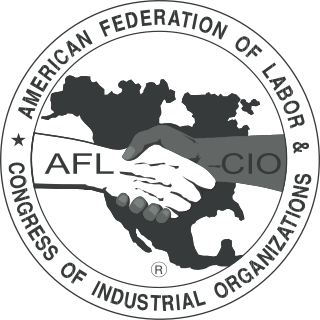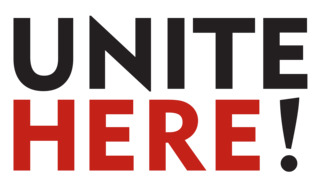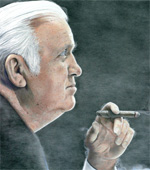Related Research Articles

The American Federation of Labor and Congress of Industrial Organizations (AFL-CIO) is a national trade union center that is the largest federation of unions in the United States. It is made up of 60 national and international unions, together representing more than 12 million active and retired workers. The AFL-CIO engages in substantial political spending and activism, typically in support of progressive and pro-labor policies.

The International Brotherhood of Teamsters (IBT) is a labor union in the United States and Canada. Formed in 1903 by the merger of the Team Drivers International Union and the Teamsters National Union, the union now represents a diverse membership of blue- and white-collar workers in both the public and private sectors, totalling about 1.3 million members in 2015. The union was formerly called the International Brotherhood of Teamsters, Chauffeurs, Warehousemen and Helpers of America.
The Communist Party USA and its allies played an important role in the United States labor movement, particularly in the 1930s and 1940s, but wasn't successful either in bringing the labor movement around to its agenda of fighting for socialism and full workers' control over industry, or in converting their influence in any particular union into membership gains for the Party. The CP has had only negligible influence in labor since its supporters' defeat in internal union political battles in the aftermath of World War II and the CIO's expulsion of the unions in which they held the most influence in 1950. After the expulsion of the Communists, organized labor in the United States began a steady decline.
The United Food and Commercial Workers International Union (UFCW) is a labor union representing approximately 1.3 million workers in the United States and Canada in industries including retail; meatpacking, food processing and manufacturing; hospitality; agriculture; cannabis; chemical trades; security; textile, and health care. UFCW is affiliated with the Canadian Labour Congress (CLC) and the AFL–CIO; it disaffiliated from the AFL–CIO in 2005 but reaffiliated in 2013. UFCW is also affiliated to UNI Global Union and the IUF.

John Joseph Sweeney was an American labor leader who served as president of the AFL–CIO from 1995 to 2009.

UNITE HERE is a labor union in the United States and Canada with roughly 300,000 active members. The union's members work predominantly in the hotel, food service, laundry, warehouse, and casino gaming industries. The union was formed in 2004 by the merger of Union of Needletrades, Industrial, and Textile Employees (UNITE) and Hotel Employees and Restaurant Employees Union (HERE).

Linda Chavez-Thompson is a second-generation Mexican-American and union leader. She was elected the executive vice-president of the AFL-CIO in 1995 and served until September 21, 2007. She was also a vice chair of the Democratic National Committee from 1997 to 2012 and served as a member of the board of trustees of United Way of America. She was the Democratic nominee for Lieutenant Governor of Texas in the 2010 election.

Transport Workers Union of America (TWU) is a United States labor union that was founded in 1934 by subway workers in New York City, then expanded to represent transit employees in other cities, primarily in the eastern U.S. This article discusses the parent union and its largest local, Local 100, which represents the transport workers of New York City. TWU is a member of the AFL–CIO.

Michael Joseph "Red Mike" Quill was one of the founders of the Transport Workers Union of America (TWU), a union founded by subway workers in New York City that expanded to represent employees in other forms of transit. He served as the President of the TWU for most of the first thirty years of its existence. A close ally of the Communist Party USA (CP) for the first twelve years of his leadership of the union, he broke with it in 1948.

Joseph Curran was a merchant seaman and an American labor leader. He was founding president of the National Maritime Union from 1937 to 1973, and a vice president of the Congress of Industrial Organizations (CIO).
Matthew "Ted" Guinan was an Irish labor organizer who was the cofounder and served as the second president of Transport Workers Union of America (TWU).
The Labor Council for Latin American Advancement (LCLAA) is a nonprofit, nonpartisan Latino organization affiliated with the AFL-CIO and the Change to Win federation. It was founded in 1972 to provide Latino trade union members in the United States with a more effective voice within the AFL-CIO, to encourage Latino participation in the democratic process, and to encourage the organization of Latino workers into labor unions.

Paul Hall was an American labor leader from Inglenook in Jefferson County, Alabama. He was a founding member and president of the Seafarers International Union (SIU) from 1957 to 1980. He was the senior vice president of the AFL–CIO at the time of his death.

Emil Rieve was an American labor leader. He was president of the Textile Workers Union of America (TWUA) from 1939 to 1956, a vice president of the Congress of Industrial Organizations (CIO) from 1939 to 1955, and a vice president of the AFL-CIO from 1955 to 1960.

The Congress of Industrial Organizations (CIO) was a federation of unions that organized workers in industrial unions in the United States and Canada from 1935 to 1955. Originally created in 1935 as a committee within the American Federation of Labor (AFL) by John L. Lewis, a leader of the United Mine Workers (UMW), and called the Committee for Industrial Organization. Its name was changed in 1938 when it broke away from the AFL. It focused on organizing unskilled workers, who had been ignored by most of the AFL unions.
Harold "Sonny" Hall was an American labor union leader.
Michael Goodwin is a former American labor union leader.
James "Jim" La Sala was an American labor union leader.
James Little is an American former labor union leader.
Harry Lombardo is an American former labor union leader.
References
- 1 2 "AFL-CIO Vice President Michael O'Brien". AFL-CIO. Retrieved 18 September 2023.
- ↑ "In Memoriam: Gary Yingst". TWU. Retrieved 18 September 2023.
- ↑ "Transit strike leaves New Yorkers out in cold". CNN. December 22, 2005. Retrieved 18 September 2023.